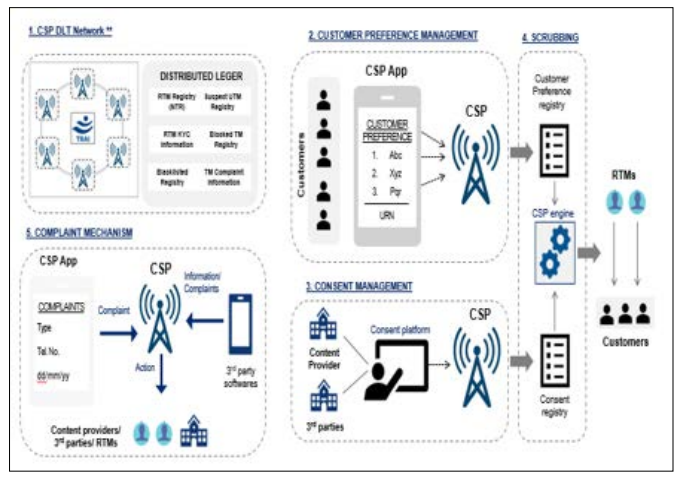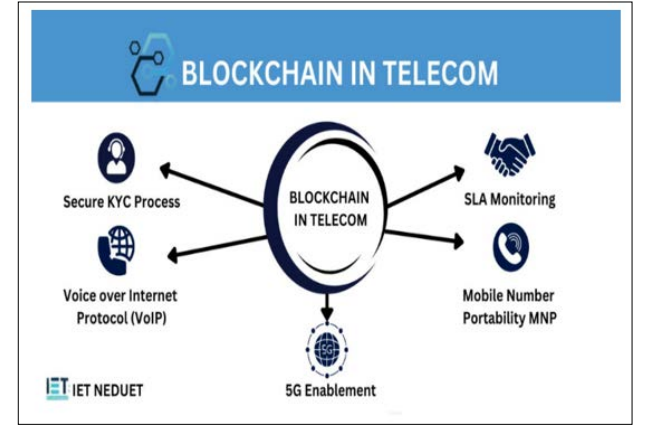Author(s): Tharunika Sridhar
Using blockchain technology into telecom networks offers a great opportunity to improve network security. The decentralized and cryptographic aspects of blockchain technology result in a more effective and resilient system for safeguarding data, preserving confidentiality, reducing risks, and preventing unauthorized access. The paper has used the secondary data sources for data collection, making qualitative data analysis, driven with ethical standards for research. From the research, blockchain integration is revolutionizing security measures in the telecom network segment by addressing the conventional.
The use of blockchain technology has grown in significance since it has the capacity to address numerous issues and offer creative solutions [1]. The telecommunications sector is essential to global connection. A significant amount of sensitive data, including user and network configurations, is managed by telecom networks. Because of its decentralised and cryptographic characteristics, blockchain provides a more secure method of handling and safeguarding this data. Blockchain, for example, can be used to protect client data from breaches and unwanted access.
The aim of the paper is to analyse the role of Blockchain technologies for enhancing security in Telecom Networks.
What is the role of blockchain technology for enhancing security in Telecom Networks.
The rationale behind this research on the role of Blockchain technologies for enhancing security in Telecom Networks has emerged from the increasing resilience towards the telecommunication for embracing the global connectivity and have the security while the data transmission on networks. The traditional methods were on the ease of data breach and get with unauthorised access. For overcoming the traditional issues, the focus is on leveraging the blockchain technologies and manage the data sensitivity, with the advanced telecom networks.
The significance of the research is on lying in its potential for making an active contribution towards improvement with security protocols in the telecom networks. The telecommunication is playing a vital role in the facilitation with communication and data on the global, to ensure the overall sensitivity and maintain the data integrity. The significance is on driven with better security in the telecom networks to bolster security aspects.
In the current digital era, the telecommunications industry is constantly changing as new applied sciences and cutting-edge solutions emerge to meet the increasing demands of businesses and consumers. The importance of ensuring the security and integrity of telecom systems has never been greater given the growing reliance on cell phones, information networks, and web access.
Blockchain technology is one area of knowledge that could completely transform telecom security [2]. After being created as the foundational technology for the cryptocurrency Bitcoin, blockchain has come to be recognised for its ability to revolutionize several sectors, including telecoms. Blockchain technology is a distributed, decentralised ledger that records transactions across several computer systems. Each transaction is virtually impossible to alter or remove because it is encrypted and intricately connected to previous transactions. Blockchain technology's tamper-proof nature makes it an excellent solution for improving telecom safety.
Large amounts of sensitive data, including financial and personal information, are transmitted across telecom networks. Telecom operators may significantly reduce the likelihood of knowledge breaches and unauthorised entry by using blockchain expertise to encrypt and secure information delivery [1]. Because blockchain is decentralised, there isn't a single point of failure, which makes it incredibly difficult for hackers to intercept or alter data while it is being transmitted.
Telecom companies are very concerned about identity fraud since hackers usually target vulnerable individuals to get illegal access to telecom networks or conduct financial fraud. Telecom operators can provide their customers with a digital ID that is incredibly secure and unchangeable by utilising blockchain expertise for identity validation and verification [3]. By preventing fraud and identity theft, this will ultimately improve the overall security of telecom companies.
As more Web of Things (IoT) devices are added to telecom networks, security risks increase since these devices can occasionally be targets of cyberattacks and hacking attempts. Telecom companies can establish a transparent and safe network of linked devices where information exchanges and transactions are recorded and validated in an unchangeable way by fusing blockchain technology with Internet of Things devices. By doing this, you can lessen the risks associated with IoT safety flaws and enhance the overall reliability of the telecom network.
The data collection is done with the secondary sources, as the relevant data collection is the standard practice to complete a paper with viable outcomes. The secondary data collection includes the data from the previously published journals, books, articles, and research. The focus of this is on to analyse the role that Blockchain technologies has for enhancing security in Telecom Networks. The relevant data is collected throughout, to attain the relevant research outcomes.
The search strategy applied is the selection of the keywords, “Blockchain technology in security”, “Blockchain technology in telecom networks”, and “Blockchain technologies on enhancing security in Telecom”. The selection of the most relevant data is chosen with these keywords. Then, with this the other filter was the year filter with the past 5 years.
The qualitative analysis is done for the collected data the objective of this thematic analysis to get with the work in uncovering the study theme, examining the study, and having a better interpretation of the data patterns and trends. The qualitative analysis is done to give the trend analysis of the role that Blockchain technologies has for enhancing security in Telecom Networks.
The overall study is done with the ethical consideration and with the strict ethical norms and standards that exists. The paper is done with the always rigorous ways in adhering with the code of conduct and get with the more informed consent at every position. The overall paper is done with academic integrity, with all the real secondary sources that are validated to deliver the validated study outcomes.
Telecommunications companies can benefit from lower infrastructure costs and faster, more dependable data transport by utilising blockchain technology to build a decentralised network. In places with little to no standard telecommunications infrastructure, this can be especially helpful. A safe and decentralised digital identity management system can be made with blockchain technology [4]. In addition to offering clients a more pleasant and efficient user experience, this can aid in the prevention of fraud and identity theft.
In enterprise telecom network, blockchain integration leads to better and embraced security, as it can also be used on centralizing the network and securing the ways to be more prevention in data breaches that might arise [4]. In enterprise telecom network blockchain uses the cryptographic algorithms in ensuring tamper proof transaction, and high-end security across.
Mobile payment options that are safer and more effective than conventional payment methods can be made possible by blockchain technology. Telecommunications companies can provide consumers with a more secure method of transferring money by utilising blockchain technology.

Figure 1: Blockchain Application for Telecom industry, Source: Wipro, 2019
Internet of Things (IoT) device networks can be made more effective and safer with the usage of blockchain technology [5]. Telecommunications operators can now give their clients with a more dependable and secure method of connecting their Internet of Things devices to the internet by utilising blockchain technology.
A more secure and effective decentralised content distribution network than one made with traditional means can be created with blockchain technology [6]. This can be especially helpful for telecom companies that provide streaming services because it can lower costs and increase the efficiency and dependability of content delivery.
For telecom companies, blockchain technology can be utilised to build a more efficient and transparent supply chain management system. Telecommunications companies can watch the flow of goods and services in real time and cut costs by doing so by utilising blockchain technology.
The integration of the blockchain in an enterprise leads to the core challenges in the enterprise which includes the issues of the scalability, the issues in interoperability, regulatory compliances issues, and creating the skill gaps in enterprise in later years of use [2].

Figure 2: Blockchain in Telecom, Source: IET on Campus NEDUET, 2023
Smart contracts that automate a variety of tasks in the telecom sector can be made using blockchain technology. In addition to offering a more open and safe method of managing contracts and agreements, this can assist lower expenses and increase operational efficiency [7].
For telecom companies, blockchain technology can be leveraged to develop a roaming management system that is safer and more effective [8]. Telecommunications companies can give their clients a more transparent and affordable option to use their services when travelling overseas by utilising blockchain technology.
The integration of the blockchain technology presents a promising position for enhancing the security within the telecom network across. The features of blockchain to have decentralization and cryptographic leads to the more impactful and robust system to protect the data, maintain the confidentiality, mitigate the risks and preventing the unauthorised access to the data. From the paper, it can be concluded that the integration of blockchain is evident and plays a significant role in revolutionizing the security measures within the telecom network segment, addressing the traditional channels. The focus on leveraging the blockchain technology in the telecom businesses are helpful in framing the more resilience, improved transparency, and have more effective network management, ensuring integrity.
The focus is on to get with the implementation of the blockchain is to get with more effective solution with management and helpful in mitigating the identification of issues and enhance the authentication process. Also, the focus can be on to get with the blockchain modes in the option, offering the customers with better security, maintaining the confidentiality and prevention of the unauthorized access to the data and sensitive information.
